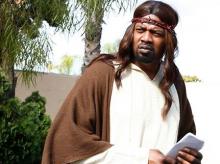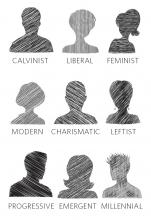Jesus

I was browsing an elaborate Halloween store and came across an aisle of religious-oriented costumes. There were the usual ones: nun, rabbi, priest. And one I’d never seen before.
Yes, you can go Trick-or-Treating as Jesus this year. There is a Jesus costume.
What do you think about that?
I’m guessing some people will feel offended; I understand and respect where they’re coming from. Others would see it as harmless and find some humor in it. (Hey, see the guy in the Jesus costume? He gave treats to the whole neighborhood using only two Swedish Fish.)
I had a feeling there was material for a blog in all of this somewhere, so I took a photo, filed the idea in the back of my brain, and moved on to inspect the rubber rats and flying bats that are more my style.
Eventually, a thought worked its way into the front of my brain:
Why shouldn’t someone wear a Jesus costume?

JESUS RETURNED this past August. Or at least a new depiction of him appeared on late-night cable television, in the comedy Black Jesus, created by Aaron McGruder (of The Boondocks). There was no rapture, and no subsequent tribulation, beyond what passes for normal these days. Instead Jesus appeared, as he did in Palestine, in a manner both obscure and mysterious. And, again, his incarnation became a scandal among some of the powerful and pious.
In Black Jesus, on the Adult Swim network, the second person of the Trinity turns up one day on the streets of Compton, a very poor and heavily African-American community in southern Los Angeles County. Played by a tall and beefy Gerald “Slink” Johnson, Jesus walks the streets in his first century robe and sandals, but with his hair in a Tina Turner perm. Aside from the eccentric get-up, this Jesus fits right into his surroundings. He has no cash, and no place to lay his head. But that goes for plenty of Comptonites. He enjoys malt liquor and marijuana, just as much as he did good wine back in the day at Cana. He’s still preaching and practicing unconditional love, forgiveness, nonviolence, and service to all, but his street talk averages about 1.5 bleeps per sentence.
There’s plenty that’s problematic about Slink Johnson’s character. For one thing, I can’t imagine the Jesus I know using the disrespectful canine term for women so freely or being quite so nonjudgmental about the marijuana trade. But neither does this depiction approach “blasphemy,” which is what the American Family Association called it. The Catholic League, which often leads the charge against perceived offenses to the faith, got it about right when it said, “The Jesus character in this show is a mixed bag: He is irreverent and can be downright crude, but he also has many redeeming qualities.”

Barbie has had a number of careers in her 55 years — flight attendant, veterinarian, astronaut, even president. Her latest role, however, is raising eyebrows.
Italy’s Catholic bishops are furious about controversial artistic depictions of the popular Barbie and Ken dolls as the Virgin Mary and a crucified Jesus Christ and other saints.
Two Argentinian artists, Marianela Perelli and Pool Paolini, produced 33 dolls of various religious figures for a show named “Barbie, The Plastic Religion,” which opens in Buenos Aires on Oct. 11.
SIR, an Italian website backed by the Italian bishops conference, denounced the controversial toys in an editorial, which asks: ” What is the difference between provocation and bad taste?”
Children are suffering from violence in the U.S. and around the world.
Michael Brown. The children of Gaza. The refugees of Central America. Only three of numerous heart-breaking stories to fill the airwaves in the last month. But, unlike the gruesome murders of innocent news reporters by ISIL, these news stories about violence toward unarmed children have faced loud voices justifying that violence.
These voices argue for the “rule of law.” They insist on the inherent goodness of hyper-militarized, monocultural police forces using tanks and tear gas against peaceful protestors. They claim the inherent righteousness of the state of Israel, even after the bombing of United Nations schools. They defend border guards and those who clamber into busses to scream violence and hate at asylum-seeking children.
So, the wounded or dead are put on trial and convicted for their own deaths, even though they were unarmed children. It’s their fault. To say otherwise is just foolishness.
Some Corinthian Gentiles and Jews must have reacted in exactly this way to the teaching of Paul. Jesus was crucified by the Romans — the imperial power that had brought peace to the city of Rome and quiet to the provinces, that legendary pax Romana about Augustus Caesar himself boasted. This was Paul’s testimony.

According to one of my favorite authors, Brennan Manning, "The single greatest cause of atheism in the world today is Christians, who acknowledge Jesus with their lips, then walk out the door and deny Him by their lifestyle. That is what an unbelieving world simply finds unbelievable." It is just a much more eloquent way of saying that the world thinks we’re a bunch of hypocrites.
To be quite honest, most of the time, the claim is warranted. I have a friend who wants nothing to do with Jesus because his father, a very religious man, was active in the local church but was abusive behind closed doors. Another friend continues to distance herself from anyone associated with the church because of their judgmental glares about her lifestyle choices.
Whatever their reasoning, I understand. I, too, have personally encountered the hypocrisy they see in our communities of faith. And if I'm at all honest, the number of times I have been the hypocrite who has turned others away are too numerous to count.

ALEXANDRIA, Va. — Rhonda Rowe and her team gathered around a diagram of the nursing home’s floor plan and determined how to split up to avoid praying with anyone twice.
Rowe made her way to a room where a 93-year-old woman lay in her bed while her 87-year-old roommate sat in a wheelchair. Rowe knelt between them and went through her “Nursing Home Gospel Soul-Winning Script.”
“Fill me with your Holy Spirit and fire of God,” the 93-year-old repeated. “I’m on my way to heaven. I have Jesus in my heart.”
Rowe was soon off to the next room, but before she left, acknowledged that she might never see them again on earth. “I’ll see you girls in heaven!” she chirped.
Welcome to the world of nursing home evangelism, where teams of lay evangelists target senior citizens for one last chance in this life for glory in the next.


We’d all love to claim Jesus for our team, but in doing so, we can safely assume that Jesus actually would wriggle free from such limitations. While it would be comforting to validate ourselves by claiming Jesus as a Baptist, Disciple, Catholic, or something else, what we’re effectively trying to do is keep from changing ourselves. We want to rest in the certainty that we’re all right how we already are, with no real need to grow or do things differently.

This summer, many Americans are watching in helpless horror as more than 52,000 children fleeing violence stream over our southern border. Many of them are making a dangerous journey by themselves to escape murder rates and gang violence in Central America, particularly El Salvador and Honduras, that are unparalleled except in countries at war.
People of goodwill at the border have offered food, water, shelter, and compassionate care to these refugee children. But protesters have screamed epithets at them and blocked buses carrying them to processing centers, despite the fact that it is not illegal for people to cross the U.S. border and ask for protection under U.S. law.
As politicians focus on midterm elections rather than on children in crisis, it’s worth remembering: Christians worship a child who fled from violence in his home country.
The Gospel of Matthew recounts the story of King Herod of Judea, who slaughtered all the babies and toddlers around Bethlehem in a desperate attempt to prevent the reign of Jesus — the child he had been told would become a king.

Right-wing politicians are fond of saying we need more Christian influence in American political life.
I don’t disagree with that. But I wonder if they have any idea what they are asking. For a nation guided by Christian principles would bear scant resemblance to their political agenda.
Take immigration, for example. Jesus practiced radical welcome, not the restrictive legalistic barriers envisioned by conservatives, and certainly not the denigration of dark-skinned immigrants and the unleashing of armed posses along the Rio Grande.
God’s people, after all, began as immigrants and refugees. God saw them as a “beacon” to all nations.

It seems like violence will never end. Portland. Seattle. Las Vegas. Isla Vista. Almost every day in Chicago. Not to mention Iraq, Boko Haram, the conflict in Ukraine, and the continued war in Afghanistan.
The Huffington Post just reported that “If it’s a school week in America, odds are there will be a shooting.” Since the Sandy Hook tragedy in 2012, the United States has averaged 1.37 school shootings per week.
And our culture is divided on how best to respond. One side declares we need to increase gun regulations. The other side insists we need more guns. The two sides are locked in a bitter political rivalry, using terms like “rights” and “responsibilities” and neither side will budge. One side will win the political battle concerning gun rights, but I fear that no matter who wins the battle it will only perpetuate the war.
I’m feeling despair, and from my Facebook feed, I know many others are feeling the same way. After all, this is so much bigger than guns; it’s about a culture of violence. But please, don’t fall into despair. We have too much work to do.

Editor's Note: This post was originally a sermon in our monthly Sojourners chapel.
Friends, grace and peace to you from God our Father and the Lord Jesus Christ.
Around the time I started middle school, my church acquired a series of books called The Left Behind Series. These books chronicle the final days of earth as outlined in the book of Revelation and other apocalyptic biblical texts. I won’t offer any commentary on the theology of these books, or even their literary value, but, as a middle-schooler, they were fairly impressionable.
The entire series begins with a dramatic reinterpretation of the rapture. People are going about their daily lives — driving to work, flying airplanes, making breakfast — when all of a sudden, people who had been there just seconds before are gone. Simply vanished into thin air. Of course, chaos ensues, because who is driving the car? Flying the airplane? Tending the stove? The world they leave behind is shattered, broken, and chaotic! This seminal event — the rapture — shapes the rest of the series as those who have been “left behind” work to win the ultimate prize — a place in heaven where they are no longer left behind.

Two weeks ago in Soma, Turkey, a coal mine explosion left 301 people dead. It was the country’s worst mining disaster, but it wasn’t the first — and it wasn’t the last, as multiple fatal accidents have happened in the two weeks since. The last time a mining disaster caught the world’s attention, we watched and waited and prayed during the rescue operation for the miners in Chile.
In Turkey, people protested in the streets of Soma — protested against Soma Mining for letting this happen, against their government for loopholes in safety rules. In response, the police issued a ban on protests and locked the city down. The ruling political party proudly announces that it has inspected that mine 11 times in the past 5 years; Soma Mining denies negligence. And the families of 301 persons mourn their losses.
This isn’t a faraway problem. In the United States, we don’t do as much traditional mining as we used to — instead, we do mountaintop removal. This has a human cost, too, in more insidious ways. The people living in Appalachia have higher rates of respiratory illness, cancer, kidney diseases, skin ailments, and more. And the landscape, which has the fingerprints of God in it, is being blown apart.
Psalm 95:4-5 says:
“In [God’s] hand are the depths of the earth; the heights of the mountains are [God’s] also. The sea is [God’s], for [God] made it, and the dry land, which [God’s] hands have formed.”

Anyone who thinks much on theology will tell you that you go through patterns of thought. For a long time, I was intrigued — and still am in many ways — by the notion of Jesus as a “third way” prophet, offering something different than both church and secular culture most of the time. As I learned of different interpretations of the crucifixion, I became obsessed with nonviolent activism, and the idea of responding to force or bloodshed with something else entirely.
Now, my latest mental track is sacrament. I am interested in what makes something a sacrament, yes, but also in the power connected to sacraments and what human beings do with that power.
I am part of the Christian Church (Disciples of Christ), a denomination that has Alexander Campbell as part of its roots. Campell was notorious for supposedly causing a stir in his local church around the sacrament of communion. At that time, the Church handed out tokens to those it deemed worthy to participate in communion. No token? No communion. So this one particular day, Campbell entered the church with his token in hand, but when they offered the elements to him, he refused, tossing the token on the ground and walking out. He went on to help start the Disciples based, in large part, on the concept of the open communion table.

Every time I go to restock my face cream at the cosmetics vendor, inevitably the sales ladies point out the fact my skin is particularly dry. Oh wait, not just dry, they say, they are also seeing signs of crow’s feet and — gasp! — some dark circles under my eyes. They masquerade as skincare health professionals with fancy dermatology equipment to properly diagnose the ills of my skin. All this, of course, so they can sell me the magic anti-wrinkle cream. And do I buy it? I do. (Dang it, you weak-willed creature.)
I recently read a book titled, Winning the Story Wars by Jonah Sachs, who pinpoints this trend over the last hundred years of advertising coined “inadequacy marketing.” He summarizes this form of storytelling as follows:
“Inadequacy stories encourage immature emotions like greed, vanity, and insecurity by telling us that we are somehow incomplete. These stories then offer to remove the discomfort of those emotions with a simple purchase or association with a brand.”
The first step in adequacy marketing is to create anxiety.

There is a line in the famous movie Ben Hur in which one of his relatives goes to hear Jesus speak. She comes back enthralled. The way she describes Jesus is by saying that he is like no one she has ever met before, that he speaks words of life. And so he did. The Gospel writers add that he spoke as one who had authority. The Message version interprets this as meaning he lived out what he spoke.
Our lives have the most impact when we live what we speak. Jesus of course is the perfect example of this. For 2,000 years he has captivated people of all races and colors. There is something about this man that is like no other. He speaks words of life and he lived those same words. He loved his enemies, he walked the extra mile, he denied himself, took up his cross and lived a life of obedience to the Father.
Our lives speak, whether we like it or not, and whether we think so or not. We are either speaking life or we are speaking death. We all have a worldview.

If you have to reassure people that you’re not abandoning them, it may be because they feel you slipping away. In John 14, Jesus is responding to the anxiety of those he loves. “I will not leave you orphaned,” he says, but it is not clear how he will keep that promise. In a few hours, his arrest, trial, crucifixion and death will all have been accomplished. It will feel as if he has, in fact, abandoned them or been torn away from them.
Jesus loses his life, and he is not the only one to suffer loss. Those he leaves behind lose him, and without him, they lose whatever security they might have felt in the world. After his death, they take refuge by hiding. They are isolated from each other and afraid of everything on the other side of locked doors.
We rarely think of what happened to Jesus as an experience of combat, but the story of his arrest includes soldiers, weapons, and at least momentary hand-to-hand combat as Peter draws a sword to slice off the ear of one of those sent to arrest Jesus. Twenty-four hours later, those who could not watch with Jesus in the garden or save him from the enemy will themselves be lost without him.

My Dear Friend,
It breaks my heart to be the one to tell you this, but I figured you might be more receptive hearing this from me. I think you already know what I'm about to tell you — it's nearly impossible you couldn't know with how loud everyone's whispers have become.
Something is terribly wrong! You are sick.
I know this isn't the news you were hoping for, but it's the truth. With this in mind, I feel now, it is more important than ever that I lay things out for you — no matter how much it pains me.

Christianity is full of labels.
Does caring about the environment make me a Liberal Christian?
Does opposing to the death penalty make me a Leftist Christian?
Does believing that women can preach make me a Christian Feminist?
Does believing in anti-violence make me a Christian Pacifist?
Does taking an anti-war stance make me an Anabaptist Christian?

To the dying church,
Sometimes you have to get worse before you get better. You are dying because you’ve been applying band aids for a far deeper problem. You are consistently doling out superficial remedies for surface wounds when the source of pain lays untreated.
Church, you have confused biblical hope for optimism. When hurting people walk through your doors, you play the positive thinking guru and dispense quick fixes with inspirational quotes. You provide cheap grace and empty promises that are driving people out your doors.
You have mistaken confidence with certitude. When people come with authentic questions, you forsake healthy dialogue in exchange for a veneer of harmony. You post your doctrinal statements at your gates and demand unsure people to come in or stay out. The resulting homogenous bubbles you’ve created are sure to burst.